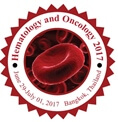Varun Goel
Rajiv Gandhi Cancer Institute, India
Title: Treatment with crizotinib of alk-positive nsclc-adenocarcinoma patients – experience from India
Biography
Biography: Varun Goel
Abstract
Background: In metastatic non small cell lung cancer (NSCLC)-adenocarcinoma patients, ALK positivity is reported in 4-6% cases and in these patients crizotinib has been associated with effective response rates and survival benefit. There is paucity of data from Indian subcontinent regarding epidemiology of ALK positive patients and responses with crizotinib.
Methods: We have evaluated ALK-rearrangement in metastatic adenocarcinoma patients from January 2013 to June 2016 via FISH as well as IHC. In patients with ALK positivity from either test, treatment with crizotinib 250 mg twice a day was done till progression or significant toxicities. In this study we assessed efficacy and toxicity of crizotinib in ALK positive patients. Results: In total, 360 adenocarcinoma tumour samples were evaluated. 25 (6.94 %) patients were positive via IHC while 14 (3.88 %) patients were positive via FISH. Moreover 2 patients were FISH positive but IHC negative. ALK positive patients consist of 15 men and 12 women, median age 60.5 years. All of these patients were treated by crizotinib. The CR was achieved in one (3.70 %) patient, PR in 14 (51.85%) and SD in 7 (25.92%) and PD in 5 (18.51%) patients. Out of 5 patients, 3 patients progressed with brain only metastasis. Disease control rate (CR, PR and SD) was seen in (81.5%) patients. The median PFS was 7.2 months. The main grade 3/4 side effects seen were neutropenia in 2 (7.47%), elevation of liver enzymes in 4 (14.81%) and fatigue in 3 (11.11%) patients.
Conclusion: Crizotinib has good efficacy with reasonable toxicity profile in Indian advanced NSCLC-adenocarcinoma patients similar to literature reported in western countries. In our study we have seen more ALK positivity with IHC testing. There is some discordance between these two methods. So, both of these tests should be done so that maximum number of patients can be benefited with ALK inhibiting TKIs treatment. This observation should be confirmed in further studies with more number of patients.

